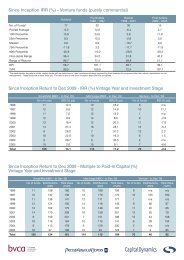A Guide to Private Equity - BVCA admin
A Guide to Private Equity - BVCA admin
A Guide to Private Equity - BVCA admin
Create successful ePaper yourself
Turn your PDF publications into a flip-book with our unique Google optimized e-Paper software.
What is private equity?<br />
<strong>Private</strong> equity provides long-term, committed share capital, <strong>to</strong> help unquoted companies grow and<br />
succeed. If you are looking <strong>to</strong> start up, expand, buy in<strong>to</strong> a business, buy out a division of your parent<br />
company, turnaround or revitalise a company, private equity could help you <strong>to</strong> do this. Obtaining<br />
private equity is very different from raising debt or a loan from a lender, such as a bank. Lenders have<br />
a legal right <strong>to</strong> interest on a loan and repayment of the capital, irrespective of your success or failure.<br />
<strong>Private</strong> equity is invested in exchange for a stake in your company and, as shareholders, the inves<strong>to</strong>rs’<br />
returns are dependent on the growth and profitability of your business.<br />
<strong>Private</strong> equity in the UK originated in the late 18th century, when entrepreneurs found wealthy individuals<br />
<strong>to</strong> back their projects on an ad hoc basis. This informal method of financing became an industry in<br />
the late 1970s and early 1980s when a number of private equity firms were founded. <strong>Private</strong> equity is<br />
now a recognised asset class. There are over 250 active UK private equity firms, which provide several<br />
billions of pounds each year <strong>to</strong> unquoted companies.<br />
Would my company be attractive <strong>to</strong> a private equity inves<strong>to</strong>r?<br />
Many small companies are “life-style” businesses whose main purpose is <strong>to</strong> provide a good standard<br />
of living and job satisfaction for their owners. These businesses are not generally suitable for private<br />
equity investment, as they are unlikely <strong>to</strong> provide the potential financial returns <strong>to</strong> make them of interest<br />
<strong>to</strong> an external inves<strong>to</strong>r.<br />
“Entrepreneurial” businesses can be distinguished from others by their aspirations and potential for<br />
growth, rather than by their current size. Such businesses are aiming <strong>to</strong> grow rapidly <strong>to</strong> a significant<br />
size. As a rule of thumb, unless a business can offer the prospect of significant turnover growth<br />
within five years, it is unlikely <strong>to</strong> be of interest <strong>to</strong> a private equity firm. <strong>Private</strong> equity inves<strong>to</strong>rs are<br />
only interested in companies with high growth prospects, which are managed by experienced and<br />
ambitious teams who are capable of turning their business plan in<strong>to</strong> reality. However, provided there<br />
is real growth potential the private equity industry is interested in all stages, from start-up <strong>to</strong> buy-out.<br />
Some of the benefits of private equity<br />
<strong>Private</strong> equity backed companies have been shown <strong>to</strong> grow faster than other types of companies.<br />
This is made possible by the provision of a combination of capital and experienced personal input from<br />
private equity executives, which sets it apart from other forms of finance. <strong>Private</strong> equity can help you<br />
achieve your ambitions for your company and provide a stable base for strategic decision making. The<br />
private equity firms will seek <strong>to</strong> increase a company’s value <strong>to</strong> its owners, without taking day-<strong>to</strong>-day<br />
management control. Although you may have a smaller “slice of cake”, within a few years your “slice”<br />
should be worth considerably more than the whole “cake” was <strong>to</strong> you before.<br />
<strong>Private</strong> equity firms often work in conjunction with other providers of finance and may be able <strong>to</strong> help<br />
you <strong>to</strong> put a <strong>to</strong>tal funding package <strong>to</strong>gether for your business.<br />
Questions <strong>to</strong> ask yourself before reading further<br />
• Does your company have high growth prospects and are you and your team ambitious <strong>to</strong> grow<br />
your company rapidly?<br />
• Does your company have a product or service with a competitive edge or unique selling point (USP)?<br />
• Do you and/or your management team have relevant industry sec<strong>to</strong>r experience? Do you have<br />
a clear team leader and a team with complementary areas of expertise, such as management,<br />
marketing, finance, etc?<br />
• Are you willing <strong>to</strong> sell some of your company’s shares <strong>to</strong> a private equity inves<strong>to</strong>r?<br />
• If your answers are “yes”, private equity is worth considering.<br />
An introduction <strong>to</strong> private equity<br />
A <strong>Guide</strong> <strong>to</strong> <strong>Private</strong> <strong>Equity</strong> 7
















